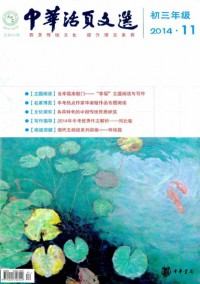初三英语上册
前言:想要写出一篇令人眼前一亮的文章吗?我们特意为您整理了5篇初三英语上册范文,相信会为您的写作带来帮助,发现更多的写作思路和灵感。

初三英语上册范文第1篇
2.寻求帮助ask for help
3.生某人的气be/get angry with sb/be mad at sb
4.考试不及格fail(in) the test
5.相处得好get on/along well with
6.和某人打架fight with/have a fight with sb
7.通过考试pass the test
8.给我一些建议give me some advice/suggestions
9.与…相同be the same as
10.与…不同be different from
11.过时out of style /fasion
12.打电话给某人call/ring sb.up/give sb.a call/ring
13为…付款 pay for
14.加入一个俱乐部join a club
15.一张球赛的票a ticket to a ball game
16.一份兼职工作a part-time job
17.时髦;时尚 in style/fasion
18.查明find out
19.邀请某人做某事invite sb.to do sth
20.同样的年龄be the same age as
21.打网球play tennis
22.和某人吵架argue with sb/have an argument with sb.
23.课外活动 after-school activities
24.直到…才…not…until
25.很快吃过晚饭 have a quick supper
26.看见某人正在做/做了某事 see sb. doing/do sth.
27.处于太大的压力之下under too much pressure
28. 从…开始 start/begin with
29.一个有着3个孩子的母亲a mother of three
30.各种各样的 all kinds of
31.为某人计划某事plan sth.for sb
32.和某人谈论某事talk about sth.with sb
33.尽可能多的 as much as possible/as much as sb. can
35.从…到…from…to…
初三英语上册范文第2篇
This week we asked students at New Star High School about the best ways to learn more English. Many said they learnt by using English. Some students had more specific suggestions. Lillian Li, for example, said the best way to learn new words was by reading English magazines. She said that memorizing the words of pop songs also helped a little. When we asked about studying grammar, she said, “I never study grammar. It’s too boring.” Wei Ming feels differently. He’s been learning English for six years and really loves it. He thinks studying grammar is a great way to learn a language. He also thinks that watching English movies isn’t a bad way because he can watch the actors say the words. Sometimes, however, he finds watching movies frustrating because the people speak too quickly. Liu Chang said that joining the English club at school was the best way to improve her English. Students get lots of practice and they also have fun. She added that having conversations with friends was not helpful at all. “We get excited about something and then end up speaking in Chinese,” she said.
你怎样学得很棒?
这个星期我们在新星高中询问了学生关于学习英语的方式。 通过讯问有关于学习英语的方法,许多学生说他们学会了。 有些学生有更加具体的建议。 莉莲・李,例如,的方式学会新的单词是通过读英国杂志。 说那记住流行音乐歌曲的词她也被帮助有点。 当我们询问学习语法,她说,我未曾学习语法, 太乏味。 韦明不同有的感觉。 他学习英语六年并真正地爱学英语。 他认为学习语法是一个巨大方式以用来学会语言。 他也认为那观看的英国电影并不是一个坏办法,因为他可以观看演员说词。 有时,因为人民太迅速,讲话然而,他发现观看的电影挫败。 刘畅说参加学校英语俱乐部是的方式以改进她的英语。 学生得到许多实践,并且他们也获得乐趣。 她增加了与朋友的交谈可使用中文根本不是有用的。她说。
How I learned to learn English
Last year my English class was difficult.First of all,it wasn’t easy for me to understand the teacher when she talked.To begin with,she spoke too quickly,and I couldn’t understand every word.Later on,I realized that it doesn’t matter if you don’t understand every word.I was also afraid to speak in class,because I thought my classmates might laugh at me.I couldn’t always make complete sentences either .Then I started to watch English-language TV.It helped a lot.I think that doing lots of listening practice is one of the secrets of beacoming a good learner.Another thing that Ifound very difficult was English grammar.So I decided to take lots of grammar notes in every class.The I started to write my own original sentences using the grammar I was learning.It’s amazing how much this helped.Now I am enjoying learning English and I got an A this term.My teacher is very impressed.
初三英语上册范文第3篇
()5.Wouldyouliketoeat__________?
A.somethingdeliciousB.delicioussomething
C.anythingniceD.niceanything
()6.Excuseme,couldyoutellme________?
A.howcanIgetthereB.howIcangetthere
C.thewaytothereD.whereisthezoo
()7.Themoongoes________theearth.
A.throughB.overC.roundD.to
()8.Whenandwhereshallwemeet?
I’llwait_____you_____theschoolgate_____8’clock.
A.for,at,atB.for,in,inC.at,at,atD.for,at,in
()9._____yoursisterafraidof_____outaloneatnight?
A.Is,goingB.IstogoC.Are,goingD.Are,togo
()10.Thebluecoatisn’ttherightsize.Wouldyoupleaseshowme________?
A.otherB.theotherC.anotherD.any
()11.Whentheclassbegins,allthestudentsmust_____andlistentotheteacher.
A.stoptotalkB.stoptalkingC.keeptalkingD.talking
()12._____metoreadthe_____words.
A.Follow,followingB.Following,follows
C.Follow,followsD.Following,follow
()13.Everyonewants______know______.
A.to,whattodoB./,whattodoitC.to,howtodoD./,howtodoit
()14.Therearelotsoftreeson_____sideoftheroad.
A.bothB.allC.eachD.every
()15.Idon’tthinkheisright,_________?
A.doIB.don’tIC.isheD.isn’the
()16.Whenshallwemeetagain?Makeit___dayyoulike,it’sallthesametome.
A.oneB.anotherC.someD.any
()17.Shanghaiis_______theeastofChinaand_____thewestofJapan.
A.in,inB.to,toC.in,toD.to,in
()18.Everystudentshouldgotoschool_____theschooluniform.
A.onB.inC.atD.with
()19.There_____abasketballmatchinourschoolnextMonday.
A.willhaveB.isgoingtoC.willbeD.isgoingtohave
()20.Thereisabridge______theriver.
A.overB.onC.inD.above
()21.IhadareallywonderfultimeinBeijing.
A.It’sapleasureB.Good,Thankyou
C.EnjoyyourselfD.Oh,I’mgladtohearthat.
()22.You_____thehomeworknow,youmayhanditintomorrow.
A.don’tneedtofinishB.needtofinishC.needn’ttofinishD.needfinishing
()23._____applesdoyouneedand_____cheesedoesyourmotherneed?
A.Howmuch,howmanyB.Howmany,howmany
C.Howmany,howmuchD.Howmuch,howmuch
()24.Itwaslate,suddenlyweheardsomeone_____forhelp.
A.shoutingB.shoutC.toshoutD.wereshouting
二、词形变换:
1.Thepolice______________(catch)therobbertomorrow,aren’tthey?
2.Therewillbe_______________(rain)tomorrow.
3.Therain_________________(stop)inafewhours.
4.Thepolicethinkthethiefisoneofthe_____________________(rob).
5._________________(luck),shecan’tfinishallthehomeworkontime.
6.Walktowardsthemarketandtakethefirst________________(turn)onyourleft.
7.Iamsurewe’llbethe________________(win)ofthefootballmatch.
8.Welookforwardto_________________(visit)yourschoolinShanghai.
9.Heisvery__________________(surprise)toseethethreemenintheroadstation.
10.Walk___________________(cross)theroadcarefully.
11.I_____________________(call)youassoonaswegetthere.
12.Look,theboys_________________(swim)acrosstheriver.
13.Ittakesonlytenminutes___________________(walk)fromheretothestation.
14.Theyinvitedthreeof_________________(we)totheirEnglishparty.
15.Thecomputerisoneof__________________(wonder)thingsofModernScienceintheworld.
16.Nexttime,ifIgothere,I__________________(visit)him.
17._____________(either)ofthebooksisgood.Wouldyouliketotrya___________(three)one.
18.Thereisazebra__________________(cross)atthetrafficlights.
19.There________________(be)ThanksgivingDayattheendofthismonth.
20.Wedon’tknowwhat___________________(happen)lastnight.
Unit3,7B
一、选择填空:ABCBA,BCAAC,BAACC,DCBCA,DACA
二、词形变换:
1.aregoingtocatch2.rain3.willstop4.robbers5.Unluckily
6.turning7.winner8.visiting9.surprised10.across
初三英语上册范文第4篇
关键词:英语中考复习;单词时态;单元;融会贯通中图分类号:G633.41文献标识码:B文章编号:1672-1578(2014)10-0096-02眼下,初中英语面临着重大的复习任务,可以说,复习起着提纲挈领、融会贯通的作用,如何合理地利用时间?如何把初一到初三的知识点全面顾及?这些都起到非常重要的作用。笔者认为,一本书接着一本书,一个单元接着一个单元,这样的复习虽然显得详尽,但却没有合理利用时间,反而没有居高临下,顾及全面,使知识点支离破碎,使学生记忆混乱,效果往往不是很理想。那么,怎么样的复习方法可以比较完美解决以上问题?笔者认为,以点带面的学习策略能够迎合以上问题的解决方法。下面笔者就从单词、时态、单元等板块进行阐述。
1.单词
比如有关颜色、职业身份、动词形容词化的单词,复习的时候应该从初一到初三一览无遗,七年级上册学生学了有关颜色的有colour,red, yellow, green, blue, black, white;有关职业身份的有student,teacher,musician,actor;有关动词形容词化的单词有boring,exciting,interesting。初一下册学生学了有关这些方面的单词有:colorful,blonde, brown (有关颜色), assistant,bank clerk, captain, guide, doctor, policeman, policewoman, shop assistant, singer, waiter, chief, reporter (有关职业身份), relaxed,surprised(动词形容词化的单词)。初二上册学生学了有关这些方面的单词有:有关颜色的词汇没有,有关职业身份的词汇有tourist, passenger, vistor, monitor, player, gymnast, pianist,champion, athlete, programmer, engineer, pilot, artist, reader, exchange student, performer,有关动词形容词化的词汇有excited。初二下册学生学了有关这些方面的单词有:有关颜色的词汇没有出现,有关职业身份的词汇有agent, attendant, barber, character, alien, Beijinger, collector, emperor, flight attendant, foreigner, hero, monster, terrorist, tutor, volunteer, waitress, winner, writer, lawyer, 有关动词形容词化的单词有amazing, annoyed, interested, bored, disappointing。 初三全册学生学了有关这些方面的单词有:有关颜色的词汇有pink, purple,有关职业身份的单词有learner, psychologist, head teacher, listener, auther, optometrist, director, farmer, fisherman, translator, sportspeople, veterinarian, chef, lead singer有关动词形容词化的单词有frustrating, terrified, fascinating, worried, tiring, thrilling, embarrassed, embarrassing,exhausted, convincing, confusing, misleading, disgusted。以上笔者以颜色等为例子进行阐述,那么其它类别的单词也同理类推。
2.时态
时态在英语教学中占有相当重要的地位,复习时态的时候,不要初一、初二、初三这样切割开来,笔者在复习的时候,常常把它分成两部分:现在时态、过去时态、将来时态。现在时态包括一般现在时态、现在进行时态、现在完成时态。过去时态包括一般过去时态、过去进行时态、过去完成时态。将来时态包括一般将来时态、过去将来时态。笔者在复习概括时态的时候,只用了一句话,一般情况下,时态由时间或相当于时间的副词决定,并且时态由动词体现出来。比如现在时态,He reads English every morning. He is reading English now. He has already read English.这三句中,表达时间的副词或状语分别为every morning、now、 already。所以第一句用一般现在时进行表达,它表示一般情况下发生的情况。第二句用现在进行时态,它表示说话时正在发生的情况,第三句用上现在完成时态,表示过去的动作对现在造成的影响,着重强调对现在的影响。在复习中,可以穿插相当量的习题进行巩固。其他类别的时态也同样道理。
3.单元
在单元复习过程中,尽量也做到顾及全面,初一到初三相关内容的单元也尽量串联一起进行复习,这样给学生以整体全面的感觉,便于他们合理利用时间,并且进行有效的记忆。比如,今年笔者在复习教学旅游度假这个话题,可以把人教版九年级Unit7 Where would you like to visit ?与初一初二有机地结合起来。这个单元围绕"Vacations"展开,让学生用"I'd like /love to…"和"I hope to…"等句型谈论各自喜欢的旅游胜地。笔者清楚地知道,学生在七年级中学习了"How was your weekend? Where did you go on vacation?",在八年级上册第三单元和第八单元已学过用一般将来时和一般过去时谈论"Vacations"这一话题,所以在教学这个单元的时候就抓住这个契机进行复习,从而以旧带新,甚至连初一的知识也带上。在七年级下册Unit9中,复习了How was your weekend ? It was terrible/great /very good. What did you/he/she/they do last weekend?I/He/She/They went to the beach.等句型,还有单词的过去式如am/is――was, are――were,go――went,clean――cleaned,do――did,have――had等。在Uint10中,笔者复习了一般过去时用法(特殊疑问句、一般疑问句及其肯定和否定回答),如:Where did you/he/she/they go on vacation?I/He/She/They went to summer camp/New York city.Did you/he/she/they go to Central Park? Yes, I/he/she/they did. No, I/he/she/they didn't. How was the weather? It was humid. How were the people? They were friendly.复习了单词museum,exam,really,rainy,were,expensive,delicious,cheap,water,cry,coner,make,made,feel,walk,back,decide,wall,palace,square等,八年级上册第三单元中,笔者复习了What are you doing for vacation ? Where are you going ? What time are you leaving ? How long are you staying ? Who are you going with ?等句型,以及go camping / hiking/sightseeing/fishing , how long,rent videos , a movie star,etc.还有一般将来时的用法。在第八单元中,复习了谈论过去发生的事情,回顾自己过去有趣的经历,正确运用一般过去时,如:Did you go to the zoo ? No, I didn't. I went to the aquarium.Did you see any animals ?Were there any sharks ?还有单词如aquarium, gift shop,souvenir等。通过一系列的复习,学生以往的漏洞或多或少地被弥补了,然后再把知识点串联起来,学生复习起来轻松多了,记忆起来简单多了。
初三英语上册范文第5篇
一、树立正确的理念,落实学生地位
要想发挥学生的主体地位,充分调动学生学习英语的积极性,教师的教育观念非常重要。教师必须树立正确的教育观、学生观,更新教学理念,明确这样一个现实:英语知识、语法的学习固然重要,但是学生的综合能力提高也是不容忽视的。教师需要顺应形势,转变自身角色,成为学生学习的“组织者和引导者”,而不是滔滔不绝的传授者。叶圣陶说:“我认为一个成功的先生,不是教书,不是教学生,而是教学生学。”教师应当落实“为学而教”的理念,教学结合,进而达到以学生的“学”为课堂中心,帮助学生掌握学习方法,养成一些好的学习习惯,“授之以渔”。在实际课堂教学中注意培养学生对英语的兴趣,形成学习英语的动力。激发学生学习英语的积极性,达到最佳学习效果。学生学习兴趣浓厚,才能够在课堂上充分发挥他们的主体作用,学生的主体作用得以发挥,学习效率就会相应得到提高,真正做到教学相长。
二、确定明确的目标,激励学生增强主体意识
学生是学习活动的最终承担者,要想落实学生的主体地位,应当首先带领学生确定明确的学习目标。只有在学生将自己的生活目标与英语学习目标相联系的时候,他们才会感觉到英语学习的重要性,自觉地增强主体意识,主动投入到英语学习中。在日常的教学工作中,教师要引导学生明确在英语学习中,他们自身的态度起着决定性的作用。教师需要经常性地激励学生,同时帮助学生树立自我激励的意识。这样,学生学习英语的动机就会被激发出来,他们就会感觉到自己是学习的主人,只有自己的不懈努力方能取得好的成绩。学生学习的主动性就会得以激发,他们会自觉地制订计划,总结方法,不断提高。
三、提供课堂展示的机会,发挥学生的主体作用
课堂是学生获得知识的主阵地,开放的课堂最重要的特征即充分发挥学生的主体作用。师生平等交流,共同参与到教学活动当中。教师在备课时应更加注重编排新颖的教学方法,发挥学生的主体作用,让学生成为学习上的真正主人。教师时刻谨记自己引导者和组织者的角色,不能包办代替学生去完成学习任务,而应当服务于学生,充分挖掘学生的潜力,提升学生学习英语的兴趣。教师要考虑到学生的兴趣所在和接受能力,利用活动、表演、英文歌、英语游戏等形式,调动学生的积极性和好奇心,配合多媒体辅助教学,让学生尽可能地感受英语的奇妙,体会成功的喜悦。
1.让学生学会质疑,主动探究英语知识
产生疑问是开始学习的第一步,学生对所学知识产生疑问,才会激发他们去进一步探究,才会继续深入,有所收获。因此,在实际教学中,教师鼓励学生大胆地提出自己的问题,并通过自主合作探究去解决自己的问题,从而达到完成学习任务的目标。例如,在学习牛津中学英语教材九年级上册第3单元Teenage problems中的Integrated skills一部分时,我先通过学生熟悉的生活问题引入,让学生谈自己在生活中遇到的困惑和苦恼,引出本单元话题并组织学生讨论话题。由于这些话题就是学生在生活中遇到的问题,所以,他们积极地参与活动,发表自己的言论,锻炼自己的口语水平。
2.发挥集体力量,引导学生合作探究新知
青少年阶段正是积极学习与人交流,在团队中表现自己的一个年龄阶段。因此,在教学中,教师有计划、有目的地组织学生进行小组合作探究。让学生在小组内研讨、探究,为学生搭建一个更加开放的、适合思维碰撞的小环境。学生首先独立思考,进而与小组成员进行合作,有利于发展他们的创造性思维。例如,在学习牛津中学英语教材九年级上册第3单元Teenage problems中的Integrated skills一部分时,我在教学中应用最多的就是将学生分成若干个4人小组,学生可以两人组合,也可以自由讨论,谈论本次关于青少年时的话题,说出他们的困扰。这样,学生在小组互动中一起合作,相互启发,他们的思维发生了不断的碰撞,在相互交流中得到了语言能力的提高。同时,这种小组合作的方式保证每一名学生都有表现自己的机会,参与到学习中去,既提高了学生的英语口语水平,又提高了学生与他人交往的能力。


